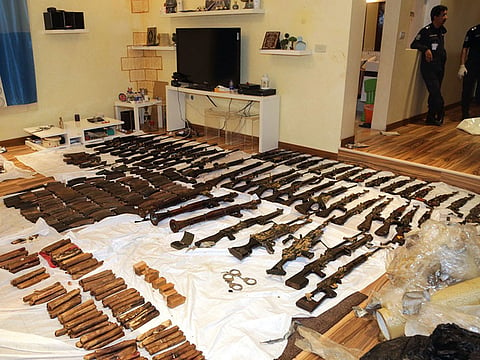Kuwait’s security is red line that can’t be crossed
There should be a full and open investigation into the recent haul of weapons and those who were responsible for it

When the Kuwaiti government announced on August 14 that it had found a huge cache of weapons in the suburb of Abdali, north of Kuwait City, people were surprised — not just by the finding but also by the quantity of weapons which included 144 kilograms of explosive, 65 rocket-propelled grenade (RPG) launchers with ammunition, and hundreds of sniper rifles with thousands rounds of ammunition. All these weapons, which can support a small army, were smuggled into the country over a period of at least four years.
Official information was scarce, but there were a lot of leaks to the press — it was the Hezbollah of Kuwait that was involved, supported by Hezbollah of Lebanon and backed up by Iran. The Kuwaiti Hezbollah is a badly kept secret. It exists, and its members are known to the public. It was active in the mid-1980s and carried out few attacks locally, to the extent of almost killing the ruler of Kuwait at the time, Shaikh Jaber Al Ahmad Al Sabah. Some of the accused where jailed but escaped from prison after the Iraqi invasion of Kuwait in August 1990. The scale of the weapons find made Kuwaiti government call for an emergency meeting. The general prosecutor released a statement banning any sort of coverage of the incident due to its sensitivity, promising that when the investigations are completed, the public would be informed.
But social media and WhatsApp were saturated by news, information and analyses of all sorts. Even some articles written by leading Kuwaiti writers, which the press had refused to publish, found their way to the public through new media. Before the ban, the names of those involved had been leaked to the press, and also of those who had been arrested. They allegedly confessed that they had undergone military training in Iran and Lebanon, and that they had fought with Hezbollah on Syrian soil. It was strangely claimed that the information about the weapons came to attention of the Kuwaiti government through the Americans, who said that the weapons were supplied “by a regional state”.
Undermining the deal
Which was this “regional state”? It could probably be Iran. If the hypothesis is right, there is a power struggle in Iran between the ‘hardliners’ and ‘moderates’. The moderates might believe that the hard-liners would like to wreck the nuclear deal reached by them with the P5+1 (the United States, Britain, France, China, Russia plus Germany). Maybe the hardliners want to undermine the deal by provoking regional upheaval, using their local agents in the region. That plot was apparently discovered by the moderates, and leaked to the Americans, to show them Iran’s “good faith” and at the same time to spoil the plans of the hardliners!
On the other hand, the discovery of the arsenal provoked a widespread reaction from Kuwaitis. Less than two months ago, a Shiite mosque was bombed by extremists. Kuwaitis from all walks of life came together in solidarity and the incident was condemned by almost all the people, and the accused put on trial. With the discovery of the arsenal, people feel betrayed, the mood has changed — especially when some try to play down the incident. Some others believe there should be be no rush to accuse Hezbollah or Iran. This type of talk is not acceptable, and makes people uneasy. Others say the “Shiites of Kuwait are less fortunate” but they should not undermine their state by giving their allegiance to another state.
The memory of the occupation of Kuwait a quarter of a century ago came to mind, as at that time events that led to the occupation were not made clear to the public, who were totally unprepared for the invasion.
The security of the state is a red line that nobody can cross.
Mohammad AlRumaihi is a professor of Political Sociology at Kuwait University. You can follow him on Twitter at www.twitter.com/@rumaihi42


